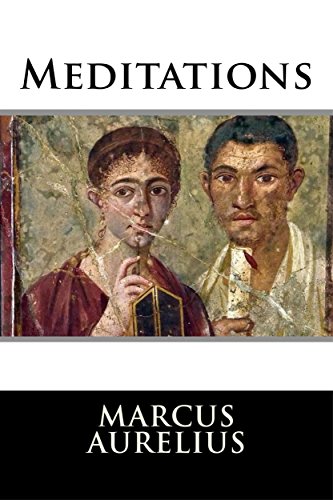Meditations
de Marcus Aurelius
Meditations Marcus Aurelius texte complet - Le téléchargement de ce bel Meditations livre et le lire plus tard. Êtes-vous curieux, qui a écrit ce grand livre? Oui, Marcus Aurelius est l'auteur pour Meditations. Ce livre se composent de plusieurs pages 107. Enhanced Media Publishing est la société qui libère Meditations au public. 2016-11-02 est la date de lancement pour la première fois. Lire l'Meditations maintenant, il est le sujet plus intéressant. Toutefois, si vous ne disposez pas de beaucoup de temps à lire, vous pouvez télécharger Meditations à votre appareil et vérifier plus tard.
Meditations is a series of personal reflections by Marcus Aurelius, Roman Emperor 161–180 CE, written over a series of years in far-flung places as he led the Romans in military campaigns, quashed revolts, and dealt with the other tribulations of governing the Empire. It is best described as a spiritual journal, containing a record of the emperor's philosophical exercises.Aurelius wrote the 12 books of the Meditations as a source for his own guidance and self-improvement. The writings take the form of quotations varying in length from one sentence to long paragraphs. He covers topics as diverse as the question of virtue, human rationality, the nature of the gods, and his own emotions, spanning from doubt and despair to conviction and exaltation. Aurelius also sets forth his ideas on Stoic philosophy.
The influence Meditations has had over centuries of thought is immeasurable. This "unendingly moving and inspiring" work is often cited alongside Jean Jacques Rousseau’s Confessions and St. Augustine’s Confessions in discussions of the most profoundly spiritual works outside of the Bible.One measure, perhaps, of a book's worth, is its intergenerational pliancy: do new readers acquire it and interpret it afresh down through the ages? The Meditations of Marcus Aurelius, translated and introduced by Gregory Hays, by that standard, is very worthwhile, indeed. Hays suggests that its most recent incarnation--as a self-help book--is not only valid, but may be close to the author's intent. The book, which Hays calls, fondly, a "haphazard set of notes," is indicative of the role of philosophy among the ancients in that it is "expected to provide a 'design for living.'" And it does, both aphoristically ("Think of yourself as dead. You have lived your life. Now take what's left and live it properly.") and rhetorically ("What is it in ourselves that we should prize?"). Whether these, and other entries ("Enough of this wretched, whining monkey life.") sound life-changing or like entries in a teenager's diary is up to the individual reader, as it should be. Hays's introduction, which sketches the life of Marcus Aurelius (emperor of Rome A.D. 161-180) as well as the basic tenets of stoicism, is accessible and jaunty. --H. O'BillovichMeditations is a series of personal reflections by Marcus Aurelius, Roman Emperor 161–180 CE, written over a series of years in far-flung places as he led the Romans in military campaigns, quashed revolts, and dealt with the other tribulations of governing the Empire. It is best described as a spiritual journal, containing a record of the emperor's philosophical exercises.Aurelius wrote the 12 books of the Meditations as a source for his own guidance and self-improvement. The writings take the form of quotations varying in length from one sentence to long paragraphs. He covers topics as diverse as the question of virtue, human rationality, the nature of the gods, and his own emotions, spanning from doubt and despair to conviction and exaltation. Aurelius also sets forth his ideas on Stoic philosophy.
The influence Meditations has had over centuries of thought is immeasurable. This "unendingly moving and inspiring" work is often cited alongside Jean Jacques Rousseau’s Confessions and St. Augustine’s Confessions in discussions of the most profoundly spiritual works outside of the Bible.Rang parmi les ventes Amazon: #646352 dans eBooksPublié le: 2016-11-02Sorti le: 2016-11-02Format: Ebook KindlePrésentation de l'éditeurMeditations is a series of personal reflections by Marcus Aurelius, Roman Emperor 161–180 CE, written over a series of years in far-flung places as he led the Romans in military campaigns, quashed revolts, and dealt with the other tribulations of governing the Empire. It is best described as a spiritual journal, containing a record of the emperor's philosophical exercises.Aurelius wrote the 12 books of the Meditations as a source for his own guidance and self-improvement. The writings take the form of quotations varying in length from one sentence to long paragraphs. He covers topics as diverse as the question of virtue, human rationality, the nature of the gods, and his own emotions, spanning from doubt and despair to conviction and exaltation. Aurelius also sets forth his ideas on Stoic philosophy.The influence Meditations has had over centuries of thought is immeasurable. This "unendingly moving and inspiring" work is often cited alongside Jean Jacques Rousseau’s Confessions and St. Augustine’s Confessions in discussions of the most profoundly spiritual works outside of the Bible.Amazon.comOne measure, perhaps, of a book's worth, is its intergenerational pliancy: do new readers acquire it and interpret it afresh down through the ages? The Meditations of Marcus Aurelius, translated and introduced by Gregory Hays, by that standard, is very worthwhile, indeed. Hays suggests that its most recent incarnation--as a self-help book--is not only valid, but may be close to the author's intent. The book, which Hays calls, fondly, a "haphazard set of notes," is indicative of the role of philosophy among the ancients in that it is "expected to provide a 'design for living.'" And it does, both aphoristically ("Think of yourself as dead. You have lived your life. Now take what's left and live it properly.") and rhetorically ("What is it in ourselves that we should prize?"). Whether these, and other entries ("Enough of this wretched, whining monkey life.") sound life-changing or like entries in a teenager's diary is up to the individual reader, as it should be. Hays's introduction, which sketches the life of Marcus Aurelius (emperor of Rome A.D. 161-180) as well as the basic tenets of stoicism, is accessible and jaunty. --H. O'BillovichExtraitBook One1.Courtesy and serenity of temper I first learnt to know from my grandfather Verus.2.Manliness without ostentation I learnt from what I have heard and remember of my father.3.My mother set me an example of piety and generosity, avoidance of all uncharitableness - not in actions only, but in thought as well - and a simplicity of life quite unlike the usual habits of the rich.4.To my great-grandfather I owed the advice to dispense with the education of the schools and have good masters at home instead - and to realize that no expense should be grudged for this purpose.5.It was my tutor who dissuaded me from patronizing Green or Blue* at the races, or Light or Heavy† in the ring; and encouraged me not to be afraid of work, to be sparing in my wants, attend to my own needs, mind my own business, and never listen to gossip.* The colours of the rival charioteers in the Circus. Roman enthusiasm for these races was unbounded; successful drivers earned large fortunes and became popular idols.† In one form of gladiatorial combat (the ‘Thracian’) the opponents were armed with light round bucklers; in another (the ‘Samnite’) they carried heavy oblong shields.
0 internautes sur 0 ont trouvé ce commentaire utile.Un excellent livrePar Client d'AmazonCe livre est une excellente introduction au mouvement du stoïcisme.Il permet de découvrir avec une bonne introduction de l'auteur la vie d'un homme réfléchi et résolu.Permet également de découvrir un peu d'histoire du temps de Marc Aurèle et la géographie des temps anciens
Si vous avez un intérêt pour Meditations, vous pouvez également lire un livre similaire tel que cc Une Ville flottante, Aroma Psy - Extrait offert: Les huiles essentielles pour vaincre stress, anxiété, dépression, Les citations du manager: Plus de 300 citations inspirantes, Boule de suif, PETIT DICTIONNAIRE DE LA MYTHOLOGIE CONTEMPORAINE, La Vie errante, Sense and Sensibility, Best Of Adult Romance 2017: 3 Histoires, Les Fleurs du Mal, Dictionnaire des idées reçues

No comments:
Post a Comment